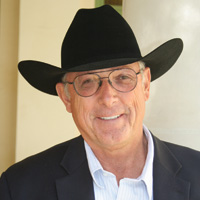 Larry Hancock
Larry Hancock
Muleshoe, Texas
A dairy pioneer on the Texas High Plains, Prairie View Dairy milks 4,200 Holsteins.
**Extended comments in blue
My wife, Pam, and I moved from Arizona shortly after graduating from Arizona State University to start Prairie View Dairy with a partner in 1978. Bailey County, Texas, had only two dairies at that time, so we were pioneers in our area, starting with 350 Holsteins on 80 acres. It has been an interesting and, at times, challenging journey over the years. Today, we milk 4,200 Holsteins in three barns and farm 3,500 acres.
Through the growth of the dairies, we have been able to organize the cows into separate barns in an effort to become more efficient. Prairie View 1, built in 1978 and the oldest of the barns, milks 350 to 400 fresh cows in a double-10 parallel twice a day. The fresh cow program seems to be working well and allows us to monitor progress until they are moved to the other barns.
First- and second-calf heifers are moved to Prairie View 3, and all other cows to Prairie View 2. Prairie View 2, built in 1990, milks 1,300 cows in a double-20 parallel two times a day. Prairie View 3, our newest barn, milks 2,400 cows in a double 35-parallel three times a day.
We have a calf facility where we raise all of our replacements, trying to keep a closed herd and selling off the bull calves shortly after birth.
One of the challenges we have had to deal with is feeding the cows. Back in 1978, feed was close and water was shallow, but due to the growth in our area and severe drought the last few years, feed is in short supply. We have had to add acreage, learn to farm ourselves and buy feed from as far away as Montana.
Muleshoe has been a wonderful place to live and raise our family of three daughters and one son. Two of our children, James and Lela, along with their families, have chosen to join with us in learning the business and stay on the farm. I can’t think of a better way to make a living.
| Hancock's Most Recent Prices | |
| Milk (3.54% bf, 3.14% prt) | $17.54/cwt. |
| Cull cows | $67-$72/cwt. |
| Springing heifers | $1,400-$1,500/head |
| Alfalfa hay (milk cow) | $285-$315/ton |
| Cottonseed | $410/ton |
| Ground corn | $260/ton |
| Canola | $275/ton |
| Soy hulls | $251/ton |

 Larry Hancock
Larry Hancock






